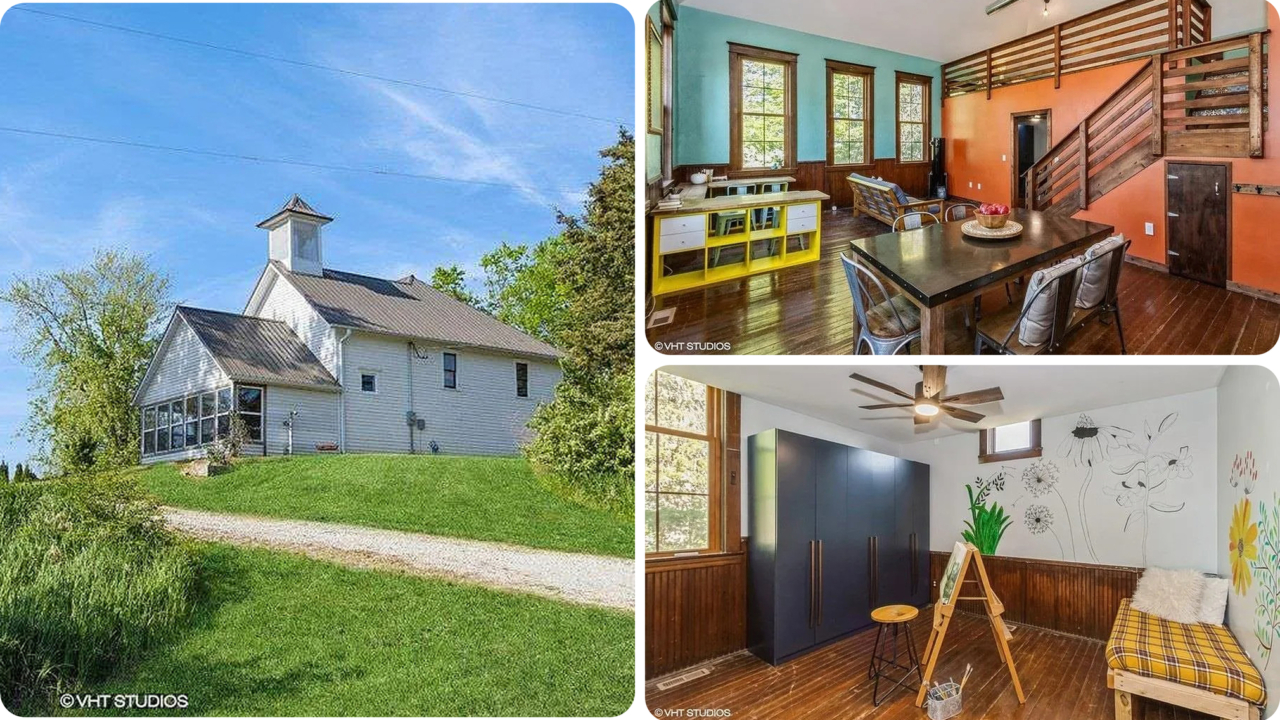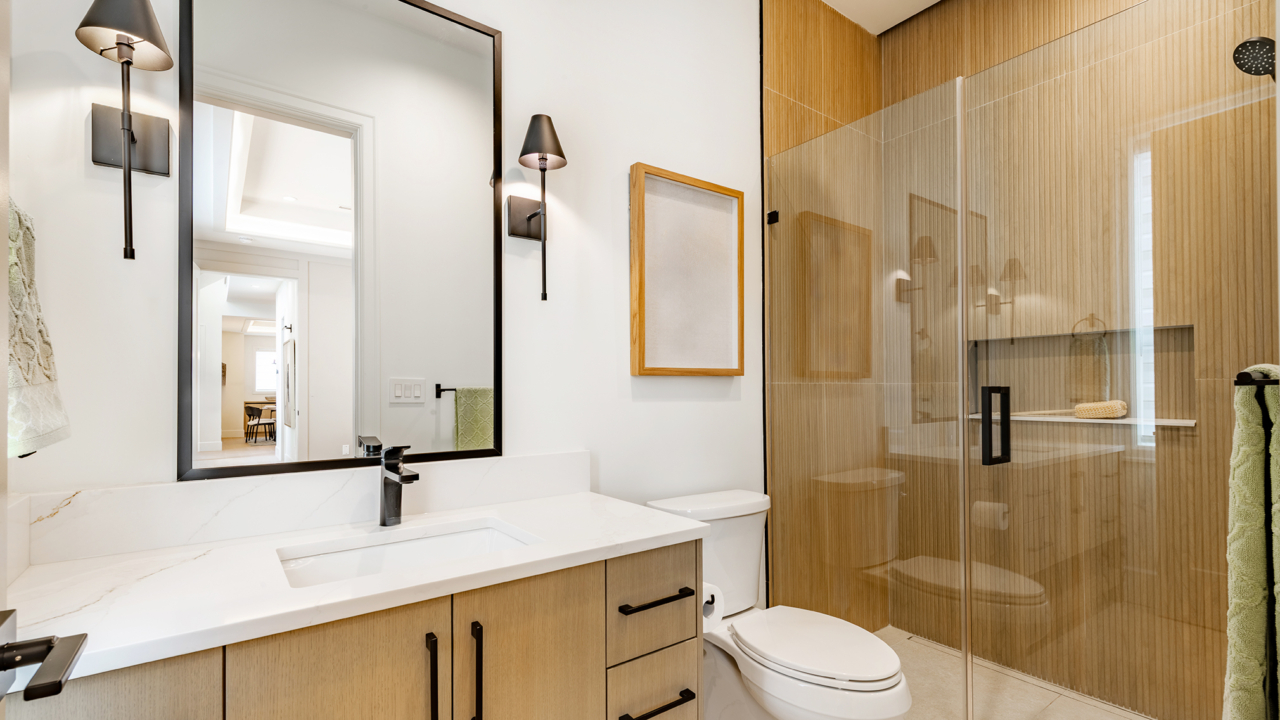Should You Remodel or Move?
It's a tough decision, but this guide will walk you through the pros and cons.


Written by May Ortega on June 4, 2025
In this article
- Determine whether remodeling or moving is more cost effective
- Research your real estate market
- Evaluate your emotional attachment to the community
- Consider your timeline needs, whether you want to move or improve
- Be realistic about remodeling solutions
- Calculate your remodeling ROI
- Understand the risks of over-improving
If you're asking yourself if you should remodel your home or just move on to a new one, there are probably a few things about your home you don't love. No home is perfect! But when you're asking yourself that question, you're really asking: Can a remodel help me feel better about my home? Would remodeling make financial sense for me? Is remodeling worth the hassle?
On the flip side, as of late 2024, nearly one in five homeowners said they’re considering selling their home. And fifty-five percent of those who do intend to sell said they want a home with new updates and nicer features, while 34% said they had a growing household. So you wouldn’t be alone if this is your motivation to sell as well.
Everyone's home, budget, real estate market and priorities are different. So the remodel-versus-sell debate always varies as well, depending on who you ask. If you're trying to make the decision for yourself on whether to give your home some upgrades or to sell it altogether, the five key steps in this article should help. And if you want some extra assistance, you can take our quiz to figure it out, too.
1. Determine whether remodeling or moving is more cost-effective
You'll incur costs no matter which path you decide to take, and what makes sense for you might not make sense for another homeowner. For some, moving is cheaper. For others, it makes more financial sense to renovate the house they already have. To find out the more affordable option for you, make sure to consider all possible expenses in order to make an accurate side-by-side comparison.
Most sellers are focused on the profit they’ll make when they sell, and they sometimes overlook all of the expenses related to selling. Keep these common expenses in mind:
Agent commissions
This is where you put on your negotiator hat. Yes, if you’re working with a real estate agent to sell your home, you’ll need to negotiate their commission. This figure can be a percentage or a flat fee. And there are various things to consider before going into this conversation with your agent. Whatever you two decide on, factor that into your selling costs. And if you still need to find a good agent to work with, you can shop around on Zillow.
Moving costs
Whether you're doing a DIY move (and paying for boxes, storage, and a rental truck) or a full-service, cross-country move with a professional moving company, everyone pays moving costs in one way or another. According to home improvement site Thumbtack, moving can cost $302 to $1,495 depending on whether you’re moving locally or long distance.
Pre-listing repairs
Even if you're not planning on making any sweeping changes to your home to get it ready for listing, there are always touch-ups and minor fixes that need to be done so your home can attract buyers who will pay your desired asking price. That could be repainting a room, cleaning your carpet, or even decluttering. According to Zillow research, 65% of sellers in 2022 took on at least two home improvement projects ahead of listing. And Thumbtack found sellers who hired a pro to help complete these tasks spent $5,400 on average.
Cost of a new home
Unless you're deliberately downsizing, you may be considering trading up to a more expensive home. FYI: the typical U.S. home value as of April 2025 is about $365,880, according to the Zillow Home Values Index. If you decide to sell instead of remodel, and if you want to stay in your same neighborhood or a comparable one, you may find yourself spending more money when you factor in the down payment, monthly mortgage payment, and taxes. The typical monthly mortgage payment as of April 2025 is $1,900, according to Zillow research.
Upsizing cost
Another often overlooked factor to upsizing your home is the cost of both utilities and maintenance compared to your old home. Do you want more square footage? Expect to spend more money heating and cooling your home. Moving from a condo to a single-family home? You'll probably spend more on lawn care, seasonal home maintenance, and exterior upkeep.
Costs of remodeling
Compared to selling, the costs associated with remodeling are a bit more straightforward. It's all about how much the renovation is going to cost you when all is said and done. And speaking of costs, you'll want to make sure you set a budget and avoid overspending. Here's an example: If your home is worth $365,880 and your kitchen is 10-15% of your square footage, you shouldn't spend more than $36,588 and $54,882 remodeling it.
The first step in figuring out how much your renovations will cost is to ask a few contractors for an estimate. Your agent (if you have one at this point) can point you to some pros they’ve worked with before.
Make sure you have a specific estimate for each of the following items:
Permits: Depending on regulations where you live, you won't usually need a permit for interior cosmetic fixes, like painting or refinishing floors. But you probably will need a permit if you're making structural changes, adding square footage, or making updates that involve plumbing or electrical. Also, if you live in a community that regulates the look of your home's exterior — like paint colors — you'll need to check into permits and restrictions. In general, your contractor should know which permits are required based on the work you're requesting.
Architectural plans: When you do a project that requires a permit, you're often also required to submit architectural plans to the city, so make sure to account for these costs. And if an HOA board is reviewing your renovation plans (say, if you live in a condo), you may need to submit plans to the board, even if the city doesn't require them.
Materials: The materials you choose for your renovation project can dramatically increase the cost of your renovation. Dreaming of an upscale kitchen with quartz countertops and custom cabinetry? Thumbtack said quartz countertops cost from $75 to $99 per square foot. Laminate, meanwhile, ranges from $27 to $34 per square foot. And make sure you decide on exactly what you want before construction starts. If you change your mind mid-project, it'll cost you to remove what’s been done.
Labor: If your upgrade is anything more than a small DIY project, you'll probably hire a professional, whether that's a plumber, electrician, landscaper or general contractor. Labor costs can add up quickly, so keep an eye out for costs you haven't planned for, like demolition, or time-intensive requests like intricate tile work.
Additional expenses: You'll want to plan ahead for other renovation-related expenses, like a hotel room if you need to temporarily vacate the home for major work, off-site storage space if you're refinishing the floors, or dining out if your kitchen is unusable.
Financing costs: You should also decide how you're willing to pay for the remodel. If you're not paying for everything in cash, calculate how much you'll pay in interest and how it will affect your finances in the long term, be it via credit cards or a loan. Some of the most common ways people pay for renovations include refinancing, a HELOC, cash-out refinancing, or a home equity loan.
Hidden costs: No home renovation project is without hiccups, so always factor in a cushion of between 10 and 20%, just in case you uncover unexpected issues along the way.
2. Research your real estate market
Your local real estate market, and even your specific neighborhood, can make a difference when it comes to deciding whether to sell or renovate. If you live in a hot real estate market, it may make more sense to sell. Here are a few ways to gauge the state of your market:
Research the area
Recent comps should help shed light on what you can expect to sell your house for.
Assess your home's marketability or appeal to buyers
Does your home need a lot of work before listing? A home in good condition usually sells faster than a fixer-upper, even in a sellers market.
Speak with an agent
An experienced local agent can give you an expert opinion on what your home would sell for.
Consider your new neighborhood
If your home has gained lots of value but you want to move to a new house in the same neighborhood, keep in mind that those homes have gone up in value, too, so your equity might not go as far as you think.
3. Evaluate your emotional attachment to the community
There's more to your sell-versus-renovate decision than just money. If you've put down roots in your current neighborhood, moving might not be the best idea. Consider these factors:
Kids: You're in a desirable school district, and your kids have friends and activities nearby.
Sense of community: You like your neighbors and have good rapport with the community — that can be hard to find. You also will want to consider if you have family nearby, especially if you count on them for child care or if you have an elderly relative to care for.
Distance to work: Your commute time is low, and a move might require a longer commute.
Lifestyle and activities: Your favorite restaurants, shops, parks and activities are nearby.
4. Consider your timeline needs, whether you want to move or improve
When you decide to move and once you get an offer, the timeline is pretty much set, with the exception of an unexpected change to the close date. Get a feel for the average time it takes to sell a house by observing your local real estate market. The biggest question mark is typically how long it'll take to get an offer. Once your home is under contract, you should be able to predict the time to close with relative certainty.
But remodeling requires more patience and flexibility. Your contractor might tell you the renovation will take eight weeks, but could then end up extending it if they run into changes, issues or delays.
5. Be realistic about what a renovation will solve
It's easy to think that a remodel will solve everything you don't like about your home, but in reality, it's not a magic bullet. There are some things that a renovation just can't fix, like having loud neighbors, an unfavorable school district, more or less square footage, or the type of home you’re living in.
6. Calculate your remodeling return on investment (ROI)
Of course, you're renovating your home so you can enjoy living in it, but someday you'll probably want to sell, so factoring in how much of your remodeling budget you'll recoup at resale is important to deciding if you should remodel or sell.
One helpful tool in calculating which renovations will give you the most bang for your buck is Remodeling Magazine’s 2024 Cost vs. Value Report, which can be filtered by region. Search through 23 common home improvements to find the ones that will be the most worthwhile in terms of resale value. In the tables below, we’ve chosen mid-range improvements — renovations with middle-of-the-road materials, not luxury finishes.
When to prioritize personal needs
Your ROI is important, but so is your happiness. Keep that in mind when deciding on your renovation project. If you love to garden and would get endless hours of enjoyment out of a backyard greenhouse, but it's not likely to be a feature that appeals to the majority of buyers down the road, that's OK — you should enjoy your home while you're living in it, otherwise you may feel like you’re renting it from the next buyers.
7. Understand the risks of over-improving
If your tastes have outgrown your local market, it might be time to consider a move. There are financial risks in creating an extravagant luxury home in a mid-priced neighborhood — when it comes time to sell, you're unlikely to recoup very much of the money you put into the project.
If a top-of-the-line, luxury or custom home is what you're dreaming of, you might think twice before renovating your existing home, because there’s a financial risk in over-improving your area.
Should I remodel or move to a luxury home?
Unless you live in a pricey neighborhood already, you can easily over-improve your home, which means that when you go to sell, you’re unlikely to recoup much of your cost. If you want that high-end home and you can afford it, you might be better off moving into a luxury home in a neighborhood where the market can support the price.
The decision on whether to remodel or to move is a significant one that calls for careful consideration of various practical and emotional factors. By evaluating your current living situation, assessing your potential return on investment, and weighing the emotional impact of each option, you can make an informed choice that aligns with your long-term goals and your financial well-being.
Tags
Ready for a new address?
Get an instant cash offer or list with a local partner agent.
Explore selling optionsRelated Articles
Sell your home with a winning strategy
Here’s how to maximize your home sale with the right selling plan.

Build a smart selling plan
Talk to your agent about their marketing approach - especially online - to ensure you’re getting the best possible price for your home.



